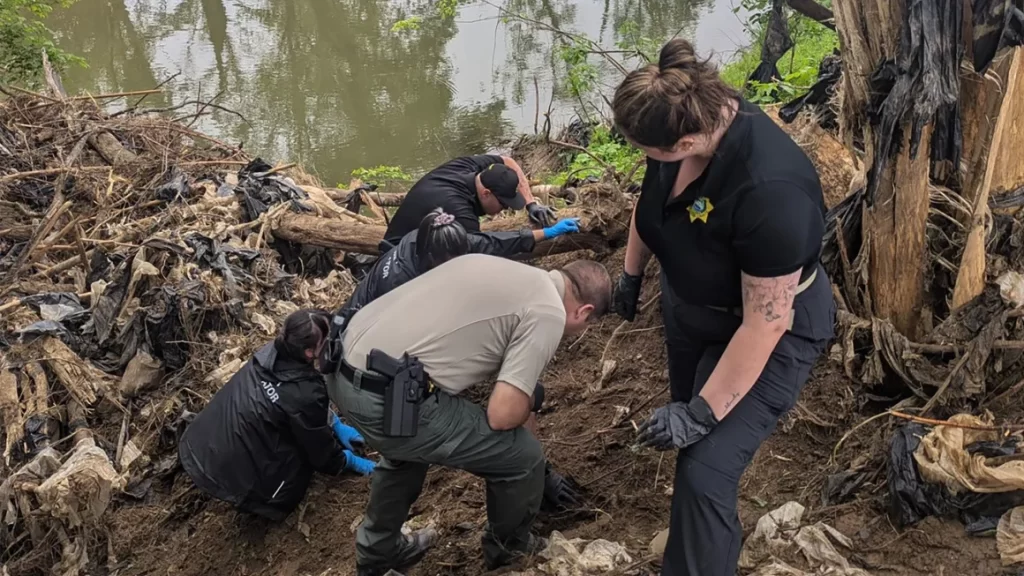Two hundred and sixteen days passed before crews in East Tennessee discovered the body of a man who had been swept away by the raging floodwaters caused by Hurricane Helene, finally bringing his family the much-needed closure they had sought for months.
Steven Cloyd and his dog disappeared on September 27 while attempting to escape rapidly rising water from the Nolichucky River near his residence, located approximately 500 miles north of where Helene, a former Category 4 hurricane, made landfall in Florida’s Big Bend region. Cloyd’s goldendoodle, Orion, was found alive 3 miles down the road, but Cloyd remained missing, a painful uncertainty his family described as “numb confusion.”
A debris removal crew located human remains on May 1 along the Nolichucky River, about 4 miles from Cloyd’s last known location. Two days later, Washington County Sheriff Keith Sexton announced that they had received confirmation from the medical examiner identifying the remains as those of Steven Cloyd.
“With heavy hearts, we the family of Steve Cloyd announce that our husband, father, grandfather, brother, uncle, and friend was found,” his widow Keli shared in a Facebook post. “We have the patriarch of our family again…He is in the light, he is at peace and he is free and he is perfect,” she added.
At least 250 people perished due to Hurricane Helene across six states, making it the deadliest hurricane to strike the US mainland since Hurricane Katrina in 2005, according to a March report by the National Oceanic and Atmospheric Administration. In Tennessee, 19 people died, the state emergency management agency spokeswoman reported in an update to CNN on Tuesday.
Following the discovery of Cloyd’s remains, one person remains missing in Washington County, the county sheriff’s office confirmed.
Steven and his dog, Orion. From Matthew Cloyd
Holding onto Hope
Two weeks after Cloyd’s disappearance, his son Matthew admitted to losing hope of finding his father alive. However, he never completely gave up hope that his father would be found. “I’d say, the hope of finding him, I think, I always still held on to a little bit of hope that we would find him. I don’t think I completely lost that,” he said.
“You just don’t want him to be out there. And you see the debris and the stuff, and you don’t want him to be out there,” an emotional Matthew expressed.
Matthew further recounted that whenever the family neared the point of losing hope, someone from the Washington Sheriff’s Office or emergency management would reach out to them, offering support and helping to restore their hope.
A Roller-Coaster Ride
In his interview with CNN, Matthew described the past few months of searching for his father as feeling like a “roller-coaster ride.”
“There’s a lot of emotions that run through your mind,” he said. “You wonder, are people looking? Do people care? Is he going to be one of the ones that’s forgotten about?”
He and his family attempted to remain calm and allow the search process to unfold, but then “panic starts to set in.” “Especially once you get into one month, two months, three months, four months and five months …you start thinking, is he really not going to be found?”
Matthew shared that he would fluctuate between feeling like he wasn’t doing enough and feeling like he was doing too much and burdening the search teams. “You feel like you’re causing unwanted stress,” he explained.
Matthew, who resides in Illinois, would divide his time between searching for his father in East Tennessee and being back home with his two children and girlfriend. He would spend weeks searching through mud and debris, sometimes accompanied by search personnel, other times just with his younger brother.
The overwhelming piles of debris and mud left by the flooding made search efforts feel almost impossible, he said. Matthew recalled one day when he and his brother were searching and found themselves standing on debris the size of a football field. “It kind of felt like the ground was beneath you, but it wasn’t – you were six, seven feet in the air,” he said.
A picture of flood victim Steven Cloyd. From Matthew Cloyd
According to Matthew, Steven Cloyd’s remains were recovered from under six feet of debris. Two men tasked with debris removal informed his mother that a flash of light had caught their attention. It turned out to be Cloyd’s wedding band. That’s when they contacted the authorities, he said.
Matthew expressed his immense gratitude for those two men. “They could’ve said screw it, we’re just gonna scoop this whole pile and throw it in the back of a truck,” he said.



